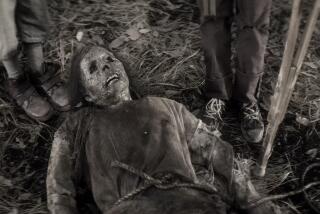MOVIE REVIEW : Battle Between Flesh and Soul in ‘Dark Habits’
- Share via
Pedro Almodovar is a film maker with a talent for irreverence and outrage. He steeps us in seamy, steamy situations, wreaks havoc with proprieties. He plays social inequities for humor, and gets dispassionately lucid about desire, lyrical and cool about sex and death.
But, in “Dark Habits” (Nuart)--his third film, released in Spain in 1984--Almodovar’s being more conventionally outrageous. The jokes don’t stick as hard. This is a a Wicked Nun movie, an anti-repression satire made in a heavily Catholic country by a flamboyantly gay film maker. And often it seems queasily daring--as if Almodovar, expecting shock, kept looking away as he pulled out the sex, drugs and blasphemy.
The nuns of Almodovar’s Convent of the Humble Redeemers--granting sanctuary to a hooker on the lam after her boyfriend’s drug overdose--are less wicked than depraved. They have names like Sister Rat of the Sewers (Chus Lampreave), Sister Manure (Marisa Paredes) and Sister Sin (Carmen Maura, Almodovar’s frequent star). Their Mother Superior (Julieta Serrano) shoots heroin and gets crushes on prostitutes and lounge singers. Sister Rat turns out to be Spain’s leading soft-core romance novelist, and Sister Manure is so addled by acid she sees everything through video distortions. The convent’s house pet is appropriate: a man-eating tiger.
Almodovar doesn’t present these nuns as hypocrites. They sin out of religious conviction. Serrano’s Mother Superior obviously believes sinners and saints are spiritually connected; she’s a repressed lesbian with a gallery of famous sexual outlaws and sex stars--like Bardot and Marilyn Monroe--on her office wall. And like Sartre or Genet, she obviously links outlawry with sainthood. The heroin needle becomes her scourge; like the nails on her bed, it’s a spike that she hopes will wound her to salvation.
But the movie--until the final battle of wills between the Mother Superior and a self-indulgent Marquesa (Mari Carillo)--lacks conflict. Perhaps the clash should have been more conventional: an innocent novitiate in a convent full of daffy, sex-crazed nuns, or a sinful outsider acting as catalyst to bring out buried lusts. But Cristina S. Pascual, who plays Yolanda, is so soporific an actress, she often suggests France’s Bulle Ogier with a hangover. Contrasting a drugged-out hooker with this already lurid crew makes for a white-on-white plot device--or black-on-black. It doesn’t yield enough contrasts; the film maunders into a succession of flatly perverse jokes.
“Dark Habits” gave Almodovar his first European reputation. And though you can sense his brilliance, the visual style here looks thin next to the icy stylishness of his 1986 “Matador” or his 1987 “Law of Desire. “ The tackier-looking “Dark Habits” (Times-rated mature, for language and sordid situations) is best when it goes completely off the edge--as in one inspired number with Yolanda doing a torchy song and striptease for an audience of nuns, while three Humble Redeemers on bongos and guitar sway on the choruses.
What gives the movie its real intensity is Serrano’s performance. Her character is so twisted and tormented--and the actress plays it with such a seraphic face and such incongruous serenity--that she supplies the comic-melodramatic battle between flesh and soul almost single-handed.
‘DARK HABITS’
A Cinevista release of a Tesauro film. Executive producer Luis Calvo. Director-script Pedro Almodovar. Camera Angel L. Fernandez. Editor Jose Salcedo. Production design Pin Morales, Roman Arango. With Cristina S. Pascual, Julieta Serrano, Marisa Paredes, Carmen Maura, Mari Carillo, Chus Lampreave.
Running time: 1 hour, 47 minutes.
Times rated: Mature (language, sordid situations).
More to Read
Only good movies
Get the Indie Focus newsletter, Mark Olsen's weekly guide to the world of cinema.
You may occasionally receive promotional content from the Los Angeles Times.










